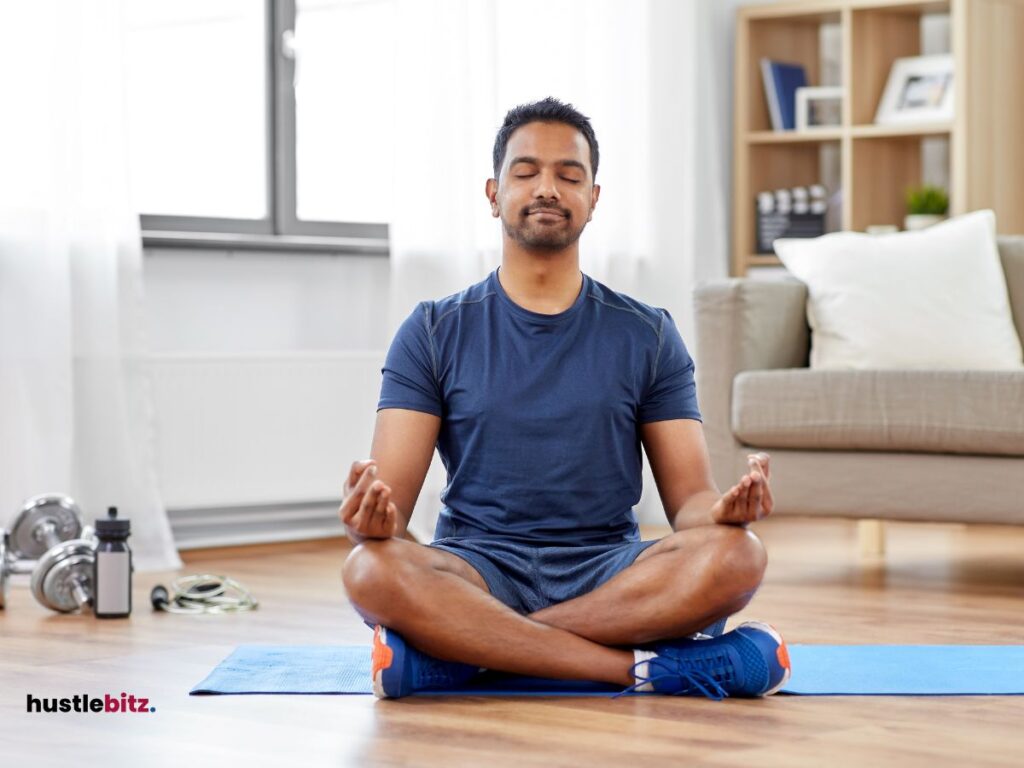Daily self-care habits are crucial for achieving a balanced and healthy life. Start by prioritizing mindfulness practices and incorporating gratitude into your routine. Hydrate adequately, establish a morning routine, and make regular exercise a priority for mental and physical well-being. Maintain a balanced diet and ensure you get quality sleep each night. Additionally, limit your screen time to enhance focus and interpersonal connections. Foster relationships with loved ones for emotional support. Implementing these strategies can significantly improve your overall health and resilience. Explore further insights on enhancing your daily self-care practices for a more fulfilling life experience.
Key Takeaways
- Prioritize mindfulness practices, such as meditation and mindful walking, to enhance emotional regulation and stay present in daily life.
- Maintain a balanced diet by incorporating diverse food groups and practicing mindful eating for better nutrition and health.
- Establish a consistent morning routine that includes gratitude practices and planning to set a positive tone for the day.
- Schedule regular exercise to boost mood, improve sleep, and enhance overall physical and mental well-being.
- Connect with loved ones regularly to foster emotional support, laughter, and a sense of belonging in your life.

Prioritize Mindfulness Practices

To cultivate a balanced life, prioritizing mindfulness practices is essential as it fosters a deeper connection to the present moment and enhances overall well-being. In a fast-paced world, where demands often overshadow personal needs, these practices serve as a refuge for those who seek to serve others effectively. Mindfulness not only calms your mind but also equips you with the tools necessary for effective stress management.
Integrating self-care practices such as meditation, deep-breathing exercises, and mindful walking can significantly impact both mind and body. These activities create a space for reflection and rejuvenation, allowing individuals to engage with their thoughts and feelings without judgment.
By dedicating time to practice mindfulness, you cultivate resilience against daily stressors, leading to improved emotional regulation and clarity of thought. Furthermore, embracing mindfulness enhances your capacity to support others, as a peaceful mind is better equipped for empathy and understanding.
When you are attuned to your own needs, it becomes easier to recognize and address the needs of those around you. This creates a positive feedback loop, where self-care translates into more compassionate interactions.
Stay Hydrated Throughout the Day

Maintaining hydration throughout the day is crucial for optimizing physical health and mental clarity. Water serves as a vital component in numerous bodily functions, including digestion, circulation, and temperature regulation.
For those devoted to serving others, staying hydrated is not merely a personal benefit; it enhances your capacity to support and uplift those around you.
To effectively incorporate hydration into your daily self-care habits, aim to drink at least eight 8-ounce glasses of water daily, adjusting for individual needs based on activity levels and environmental conditions. Consider keeping a refillable water bottle at your desk or in your bag to remind you to drink regularly.
By prioritizing hydration, you not only improve your health but also foster a sense of emotional well-being that enables you to engage wholeheartedly in your commitments.
Moreover, adequate hydration plays a significant role in achieving a healthy work-life balance. Dehydration can lead to fatigue, irritability, and decreased concentration, making it challenging to perform at your best.
Establish a Morning Routine

Establishing a consistent morning routine can significantly enhance productivity and set a positive tone for the day ahead. By dedicating time each morning to self-care habits, individuals can foster a sense of balance and well-being, enabling them to better serve others throughout the day. A well-structured morning routine not only promotes mental clarity but also encourages physical wellness through practices that align with a balanced diet and adequate sleep.
To create an effective morning routine, consider incorporating the following elements:
- Practice Gratitude: Begin each day by acknowledging the things you are grateful for. This simple act can shift your mindset and cultivate a positive outlook.
- Mindful Nutrition: Fuel your body with a healthy breakfast that includes a balanced diet of proteins, healthy fats, and carbohydrates. This will provide sustained energy and enhance focus.
- Reflection and Planning: Take a few moments to reflect on your goals for the day. Jotting down intentions can clarify priorities and enhance your ability to serve others effectively.
Implementing these practices can create a nurturing environment that promotes emotional and physical well-being. By establishing a morning routine, you not only empower yourself but also inspire those around you. Remember, the way we start our day often dictates how we engage with the world, making it essential to prioritize self-care as a foundation for a fruitful and balanced life.
Incorporate Regular Exercise
Building on a solid morning routine, incorporating regular exercise is vital for enhancing both physical and mental well-being. Engaging in physical activity is not merely a means to maintain physical health; it is an essential self-care habit that fosters resilience and improves overall quality of life. When individuals prioritize regular exercise, they cultivate a foundation of strength and vitality that extends beyond the gym.
Research consistently demonstrates that exercise can significantly boost your mood. The release of endorphins during physical activity acts as a natural mood lifter, combating feelings of stress and anxiety. For those in service-oriented roles, maintaining emotional balance is crucial, as it enables them to give their best to others. By committing to a routine that includes regular exercise, individuals can enhance their capacity to support and uplift those around them.
Moreover, regular exercise contributes to better sleep patterns, increased energy levels, and improved cognitive function, all of which are essential for effective service to others. Whether it’s a brisk walk, a dance class, or a strength-training session, finding an enjoyable form of exercise makes it easier to establish consistency.
Incorporating regular exercise into your daily self-care habits not only enhances your physical health but also empowers you to serve others with greater compassion and energy. Therefore, make a conscious effort to integrate movement into your daily life, as it is a powerful investment in both your well-being and your ability to positively impact those around you.
Practice Gratitude Daily

Practicing gratitude daily fosters a positive mindset, enhancing overall emotional well-being and resilience. Recognizing and appreciating the positives in our lives can significantly improve our emotional health, making it an essential aspect of self-care. When we prioritize gratitude, we not only uplift ourselves but also cultivate an environment that encourages others to practice self-care as well.
One effective way to integrate gratitude into your daily routine is through the use of a gratitude journal. This simple yet powerful tool allows individuals to reflect on and document their daily blessings, fostering a deeper connection with their emotions and experiences.
Here are some benefits of maintaining a gratitude journal:
- Improved Mental Clarity: Writing down what you are thankful for can clear mental clutter, allowing for better focus and decision-making.
- Enhanced Relationships: Expressing gratitude can strengthen your connections with others, promoting a culture of appreciation and kindness.
- Increased Resilience: Acknowledging the positives in life helps build resilience, enabling you to navigate challenges with a more balanced perspective.
Incorporating daily gratitude practices into your self-care routine is important for nurturing your emotional health and well-being. By setting aside time each day to reflect on what you appreciate, you not only enhance your own life but also inspire those around you to embrace gratitude.
Ultimately, the practice of gratitude serves as a foundation for a balanced and fulfilling life, enabling us to serve others with greater compassion and understanding.
Schedule Time for Hobbies

Consistently scheduling time for hobbies is essential for fostering creativity and reducing stress in our daily lives. Engaging in activities that we are passionate about not only enhances our personal wellbeing, but also empowers us to serve others more effectively. By making it a priority to carve out time for these pursuits, we cultivate a more balanced existence that enriches both our own lives and the lives of those around us.
To effectively integrate hobbies into our routine, consider the following strategies in the table below:
| Strategy | Description |
| Identify Interests | Reflect on what activities bring you joy and fulfillment. |
| Set Specific Times | Designate regular time slots in your calendar. |
| Start Small | Begin with short sessions to avoid overwhelm. |
| Stay Flexible | Be open to adjusting your schedule to find what works. |
| Share with Others | Involve friends or family to enhance the experience. |
Limit Screen Time

Limiting screen time is crucial for maintaining mental and emotional well-being, as excessive exposure can lead to increased stress and diminished focus in daily life. In our technology-driven world, it is essential to recognize the impact that screens can have on our overall health.
By setting boundaries around screen use, individuals can cultivate self-care habits that foster a healthier lifestyle.
To effectively limit screen time, consider implementing the following strategies:
- Establish specific times for device use: Designate certain hours of the day for checking emails or social media, ensuring that these times do not encroach upon personal or family moments.
- Create tech-free zones: Identify areas in your home, such as the bedroom or dining room, where devices are not allowed. This encourages face-to-face interactions and promotes a more mindful environment.
- Engage in alternative activities: Replace screen time with hobbies like reading, exercising, or engaging in creative pursuits that can enhance mental clarity and reduce stress.
Maintain a Balanced Diet

A balanced diet is essential for overall health and well-being, providing the necessary nutrients to support physical and mental functions. To maintain a balanced diet, it is crucial to incorporate a variety of food groups, including fruits, vegetables, whole grains, lean proteins, and healthy fats. This diverse intake ensures that your body receives the vitamins, minerals, and antioxidants needed to function optimally.
Self-care means taking the time to prioritize your nutritional needs, recognizing that eating healthy is not merely a choice but a vital component of a balanced lifestyle. By planning your meals and snacks ahead of time, you can avoid impulsive eating decisions that often lead to unhealthy food choices. Additionally, consider the importance of portion control and mindful eating, which can enhance your relationship with food and support your health.
Self-care is an important aspect of maintaining overall wellness, and a balanced diet plays a pivotal role in this equation. Engaging in healthy eating habits not only improves your physical health but also positively influences your mental well-being.
For those looking to serve others, modeling healthy eating habits can inspire friends and family to adopt similar practices, fostering a community that values health and wellness.
Get Quality Sleep
Quality sleep is a fundamental aspect of self-care that significantly impacts both physical health and mental well-being.
For individuals dedicated to serving others, ensuring that one is getting enough sleep is crucial, as it directly influences one’s capacity to support and uplift those around them. The recommended hours of sleep for adults typically range from seven to nine hours per night. By prioritizing sleep as one of your essential self-care habits, you can better manage stress and anxiety, enhancing your overall effectiveness in your personal and professional life.
To cultivate a healthy sleep routine, consider the following practices:
- Establish a consistent sleep schedule: Going to bed and waking up at the same time each day helps regulate your body’s internal clock.
- Create a calming bedtime environment: Reducing noise, adjusting the room temperature, and limiting screen time can promote relaxation and signal your body that it’s time to wind down.
- Incorporate relaxation techniques: Engage in activities such as reading, meditation, or gentle stretching to help you decompress and prepare for restorative sleep.
Connect With Loved Ones

Nurturing connections with loved ones is essential for emotional well-being and plays a vital role in maintaining a balanced life. Engaging in meaningful relationships through regular interactions can significantly enhance both mental and physical health. Spending time with loved ones not only provides emotional support but also helps you manage stress and fosters a sense of belonging, which is critical for achieving life balance.
To illustrate the importance of connecting with loved ones, consider the following table:
| Connection Type | Benefits | Recommended Activities |
| Family Relationships | Emotional support, shared history | Family dinners, game nights |
| Friendships | Laughter, camaraderie | Coffee dates, outdoor activities |
| Community Engagement | Sense of belonging, support networks | Volunteering, group classes |
| Romantic Relationships | Intimacy, companionship | Date nights, shared hobbies |
Incorporating these self-care habits into your daily routine can lead to stronger bonds and more fulfilling interactions. Whether it’s a quick phone call to check in or a planned get-together, prioritizing quality time with those you cherish lays the groundwork for a healthier lifestyle. As you cultivate these connections, you will find that your emotional resilience increases, allowing you to navigate life’s challenges more effectively. Ultimately, investing in relationships is a powerful strategy for enhancing your overall well-being and achieving a harmonious life balance.
Final Thoughts
Incorporating daily self-care habits into your routine is essential for achieving a balanced and healthy life. By prioritizing practices like mindfulness, regular exercise, quality sleep, and meaningful connections with loved ones, you can significantly enhance your physical, mental, and emotional well-being. These habits not only improve your overall health but also empower you to better serve those around you. Remember, self-care is not just an act of self-love but a foundation for a more fulfilling and resilient life.




